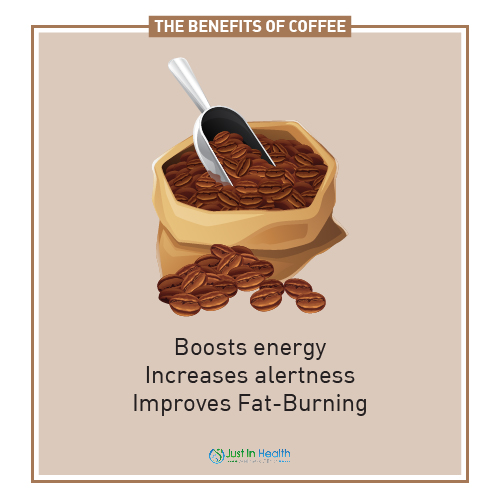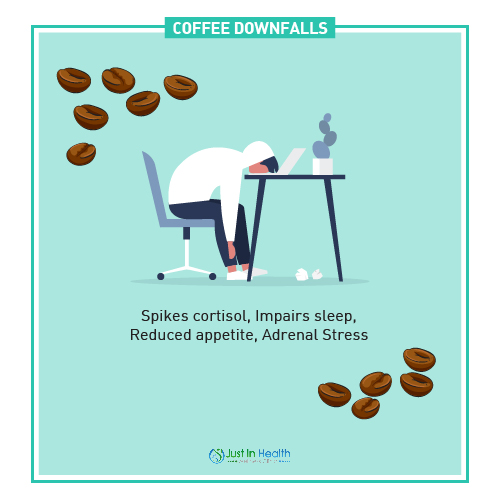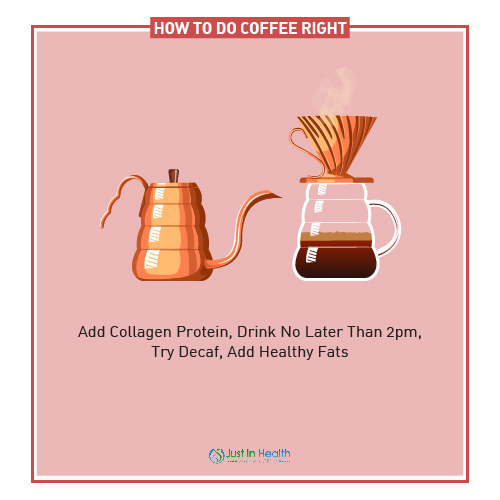

By Dr. Justin Marchegiani
There’s no doubt coffee is an efficient way to get the day started strong–but does the temporary energy boost lead to an energy loss in the long run? Let’s dive into the pros and cons of this beloved caffeinated concoction to determine whether coffee is benefiting or draining you.

Our brains have an inhibitory neurotransmitter called adenosine, which helps to calm and relax. Coffee decreases adenosine–the compound that decreases energy and alertness–thereby increasing energy!
This adenosine-dampening effect helps boost energy and focus, and can be particularly useful for burning fat. Taken before a workout, caffeinated coffee (averaging between 150-300 mg of caffeine per cup) helps increase lipolysis: fat burning. There are also many people who opt to swap coffee for breakfast to remain in ketosis: a cup of coffee with healthy fats (grass-fed butter, coconut oil, MCT oil, pastured egg yolk…) can be a fat-burning yet quite satiating meal replacement that helps you stay in ketosis while keeping you full and alert.
High quality coffee is actually quite nutrient-packed. B vitamins, a lot of alkaloids, and antioxidants are especially abundant in coffee. There are also several studies which indicate coffee may be neuro-protective, providing protection from neurological diseases like Alzheimer’s, Parkinson’s, and dementia.
Are you dealing with chronic fatigue? functional medicine doctor.

If you suffer from adrenal or thyroid issues such as adrenal fatigue or hypothyroidism, take note of how caffeine affects your condition and pay attention to how you feel in the hours and days after its consumption.
Coffee stimulates adrenaline and the adrenals–if you have healthy adrenal function, this is similar to getting a little cortisol or adrenaline push which may boost your energy and performance. If you have adrenal fatigue, however, you may want to exert a little caution when it comes to caffeinated coffee.
The science is somewhat contradictory: some studies show caffeine affects cortisol levels, some studies say it does not affect cortisol levels, and others have shown that habitual coffee drinkers have a reduced cortisol secretion response. Clearly, we need more research on this topic. Ultimately, research seems to indicate that there are a wide range of responses to caffeine intake. If you have adrenal fatigue or other adrenal/thyroid issues, it is wise to consult a professional who can help you test and track caffeine’s effect on your unique biology.
Cortisol rises and falls with your body’s internal clock– cortisol rhythm should be aligned with your circadian rhythm, rising in the morning and lowering in the evening. However, those with hormone imbalances may have cortisol issues. If you feel fatigued during the day but get a burst of energy at night (making it hard to fall asleep), you may have a hormonal imbalance, adrenal fatigue, or thyroid issues. This can be exacerbated by coffee, particularly if you are drinking it too late in the day. Coffee can keep you ramped up even 6 hours after drinking it, so it is recommended to have your last cup no later than 2pm.

Coffee is an incredibly useful substance which provides us with energy and alertness when used correctly. To avoid the downfalls of this caffeinated beverage, here are some tips to get the most out of every sip.
Coffee can put your body in a sympathetic state, reducing appetite. If you are doing a keto coffee with added fat (like butter), you may feel like you can go for hours without eating. While this may work great for a healthy individual, if you have compromised adrenals or thyroid, it is important to eat regularly to prevent putting extra stress on your body. A combination of adrenal fatigue or hypothyroidism, caffeine, and fasting can cause undue stress. Be sure to eat meals at good intervals of every 3 hours or so, depending on your body: grass-fed meats, healthy fats, and organic veggies. It is also beneficial to add a high quality source of protein or a collagen powder to your coffee.
Decaffeinated coffee can be beneficial for those with adrenal fatigue or thyroid issues who want to avoid the burden of consuming caffeine. Be aware, caffeine is a natural pesticide, and decaffeinated coffee is sprayed more heavily to compensate. Organic coffee grown without pesticides will help you avoid this common downfall of decaf coffee. Just be sure the coffee is decaffeinated via a Swiss water process, not the toxic and carcinogenic benzene or methyl chloride process.
Ultimately, every individual has unique biochemistry and whether coffee is helpful or harmful will depend on: the state of your health, the quality of the coffee you buy, and how you use it. Choose a high quality coffee grown without pesticides and checked for mold. If you have autoimmune issues, it might be best to cut caffeine for a little bit to see how it affects how you feel. Unless you’re in ketosis, a great way to prepare coffee is by adding healthy fats like grass-fed butter or coconut oil, along with a protein powder. This combination turns coffee into more of a ‘meal’ which supports your thyroid and adrenals.
References:
https://www.ncbi.nlm.nih.gov/pmc/articles/PMC3805807/
Strahler, J., Skoluda, N., Kappert, M. B., & Nater, U. M. (2017). Simultaneous measurement of salivary cortisol and alpha-amylase: Application and recommendations. Neuroscience & Biobehavioral Reviews, 83, 657-677.
al’Absi M, Lovallo WR. (2004). Caffeine effects on the human stress axis. In: Nehlig A, editor. Coffee, tea, chocolate and the brain. Boca Raton, FL: CRC Press; p. 11331.
Lovallo, W. R., Al’absi, M., Blick, K., Whitsett, T. L., & Wilson, M. F. (1996). Stress-like adrenocorticotropin responses to caffeine in young healthy men. Pharmacology Biochemistry and Behavior, 55(3), 365-369.
Harris, A., Ursin, H., Murison, R., & Eriksen, H. R. (2007). Coffee, stress and cortisol in nursing staff Psychoneuroendocrinology, 32(4), 322-330.
https://www.ncbi.nlm.nih.gov/pubmed/21531247
Gavrieli, A., Yannakoulia, M., Fragopoulou, E., Margaritopoulos, D., Chamberland, J. P., Kaisari, P., Kavouras, S. A., & Mantzoros, C. S. (2011). Caffeinated Coffee Does Not Acutely Affect Energy Intake, Appetite, or Inflammation but Prevents Serum Cortisol Concentrations from Falling in Healthy Men. The Journal Of Nutrition, 141(4), 703-707.
Lovallo, W., Farag, N., Vincent, A., Thomas, T., & Wilson, M. (2006). Cortisol responses to mental stress, exercise, and meals following caffeine intake in men and women. Pharmacology, biochemistry and behavior, 83(3), 441-447.